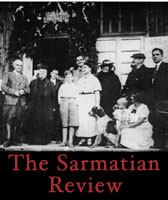| This Issue | Back Issues | Editorial Board | Contact Information |

From the Editor
January 2002
Volume XXII, No. 2
Professor Harold Segel's essay (delivered as a lecture at Rice University in October 2000) gives the issue of Polish literary presentations of Jewish topics a much-needed non-Polish perspective. Polish scholars are generally enamoured of the thesis that pre-partition Poland treated Jews well, as witnessed by the multiplicity of Jewish institutions that came to being in the Polish-Lithuanian Commonwealth, eventually to congeal into a Jewish nation. In this vein, Segel's contention that 19th-century Polish literature generally treated Jewish subjects without malice rings pleasantly to Polish ears. The same could be said of the comparison between Eliza Orzeszkowa and Stanislaw Vincenz on the one hand, and Yiddish literature on the other. However, Segel also notes that from a Jewish perspective, Polish representations of Jews (Orzeszkowa being a prime example) appear condescending and shallow. Segel's insights help explain why today's American Jews reject such portrayals as Orzeszkowa's Meir Ezofovicz, Mickiewicz's Jankiel, or Cyprian Norwid's "Jews of Poland," attributing unacceptable condescension to their authors. From a Polish perspective, however, it may appear that such a wholesale rejection amounts to a rejection of the notion of reciprocity, thus endangering a necessary dialogue with the Other. To quote Dipesh Chakrabarty, it creates "the field of possibilities that is already structured from the very beginning in favor of certain outcomes."
Segel rightly notes that Polish scholarship on Polish Jews compares unfavorably with German scholarship on German Jews. The sentimentality of some Polish responses to Jewish subjects is matched only by their shallowness. I remember visiting Poland after some Jewish congress had taken place there, and the puzzlement of gift shop owners who stacked their stores with little sculptures of Hasidic Jews and wondered why American Jews never bought them. American Polonia loves to purchase Cracovian costumes, so why wouldn't American Jews purchase the likenesses of their great-grandfathers? Again, a misunderstanding of major proportions that stems partly from Polish unwillingness to engage in a serious study of the history of Polish lands.
The present issue also contains segments of Zofia Ptasnik's Diary. This 50-year-old Polish woman was one of the victims of Soviet crimes committed against Polish civilians. Coincidentally, the issue also carries an announcement of a lecture by Leonard Krazynski, Honorary Consul of Poland in Houston, about his recollection of a deportation to Kazakhstan. Nearly one million Polish citizens were so deported, and about half died of various hardships, while tens of thousands were executed.
The Ptasnik family picture on our front cover was taken on the occasion of the blessing of a new water mill erected on Zofia Ptasnik's farm in 1936. In a feminist vein, this middle-aged widow with an underage son could have taken pride in her business ability and her industriousness: she ran the farm after her husband died, and she made it grow. It was this kind of family that the Soviets prioritized on their "destruction lists" when they attacked Poland on 17 September 1939: Polish, Catholic, enterprising. To destroy this middle-class way of life was the goal. There is too little understanding in American academia of why this destruction was so ardently desired. The social breakdown caused by so massive an elimination from society of potential role models has not been studied.
We have initiated a new section of our journal titled "Our Take." It is dedicated to current philosophical, cultural and social issues of interest to Americans of Central and Eastern European background. In the inaugural essay, we polemicize with Stanley Fish's contention that values are relative and that there is no need to seek universal standards in social and political life. Americans of Polish background in particular would likely take exception to Professor Fish's views. We feel it is important that such polemics be carried out in a journal that deals with postcommunist East and Central Europe, for it was a dedication to universal values that sustained Polish Solidarnosc and made communist rulers retreat before this mass movement.
Back to the January 2002 issue
The Sarmatian Review
sarmatia@rice.edu
Last updated 1/25/02